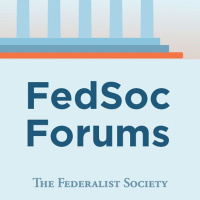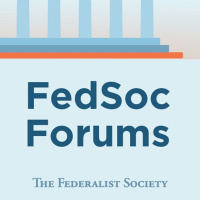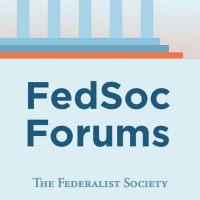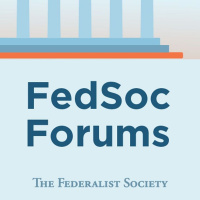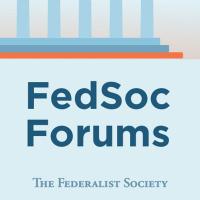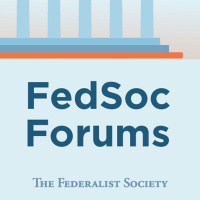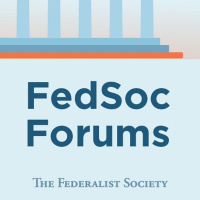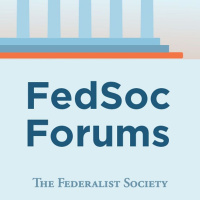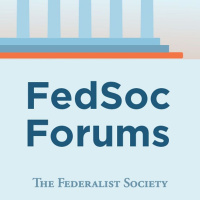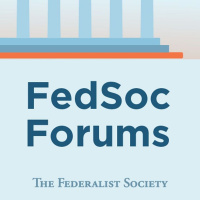Sinopsis
This series of podcasts features experts who analyze the latest developments in the legal and policy world. The podcasts are in the form of monologues, podcast debates or panel discussions and vary in length. The Federalist Society takes no position on particular legal or public policy issues; all expressions of opinion are those of the speakers. We hope these broadcasts, like all of our programming, will serve to stimulate discussion and further exchange regarding important current legal issues.
Episodios
-
A Significant Year for Religious Liberty?
04/06/2025 Duración: 54minFor the first time in years, the U.S. Supreme Court is addressing questions of religious liberty and is doing so with three significant cases: Catholic Charities Bureau, Inc. v. Wisconsin Labor & Industry Review Commission, Mahmoud v. Taylor, and Oklahoma Statewide Charter School Board v. Drummond, which have the potential to shape religious liberty in the United States for years to come.Join Mark Rienzi and Bill Saunders as they discuss these cases, their potential outcomes, and their future impact on religious liberty.Featuring:Prof. Mark L. Rienzi, President, Becket Fund for Religious Liberty; Professor of Law and Co-Director of the Center for Religious Liberty, Catholic University; Visiting Professor, Harvard Law School(Moderator) Prof. William L. Saunders, Director of the Program in Human Rights, Catholic University of America
-
A Conversation on the Right: Should the Federal Government Shape School Curriculum?
04/06/2025 Duración: 59minWith Republicans holding control in Washington, a significant debate has emerged within conservative circles regarding the role of the federal government in primary and secondary education. Should conservatives leverage their electoral mandate to influence the curricula of K-12 schools, or is good governance better served by a more restrained approach? What is the purview of the federal government when it comes to education, and what is better left at the state and local level? What changes, if any, should the government try to implement, and what would be the best methods available?Join us for an expert discussion on these and related issues.Featuring:Robert S. Eitel, Co-Founder and President, Defense of Freedom InstituteRoger Severino, Vice President of Domestic Policy and The Joseph C. and Elizabeth A. Anderlik Fellow, The Heritage Foundation(Moderator) Sarah Parshall Perry, Vice President & Legal Fellow, Defending Education ***This program was originally scheduled for May 1st, but has been rescheduled
-
Courthouse Steps Decision: Seven County Infrastructure Coalition v. Eagle County, Colorado
04/06/2025 Duración: 49minThis case concerned the question of whether the National Environmental Policy Act (NEPA) requires an agency to study environmental impacts beyond the proximate effects of the action over which the agency has regulatory authority. When the Surface Transportation Board granted a petition from the Seven County Infrastructure Coalition to construct and operate an 80-mile Utah railway, they conducted an environmental review in which they considered direct impacts of the highway on nearby land, water, and air. But they did not consider certain environmental “downline impacts” or possible effects on historic sites along the Union Pacific line in Eagle County. The county challenged their review as inadequate, while the Board argues that these effects were either too minimal for serious analysis, or outside the scope of their authority.This case was decided 8-0 on May 29. The Court ruled in favor of the Seven County Infrastructure Coalition, concluding that the federal environmental review process does not
-
Courthouse Steps Decision: Barnes v. Felix
03/06/2025 Duración: 43minIn Barnes v. Felix the Supreme Court addressed what context courts need to consider when evaluating an excessive force claim brought under the Fourth Amendment.Some circuits, including the Fifth Circuit (which decided Barnes before it reached the Supreme Court), as well as the Second, Fourth, and Eighth Circuits, had adopted the “moment of threat” doctrine. This approach focuses solely on whether there was an imminent danger that created a reasonable fear for one’s life in the immediate moments preceding the use of force. In contrast, other circuits, including the First, Third, Sixth, Seventh, Ninth, Tenth, Eleventh, and D.C. Circuits, held that courts must consider the “totality of the circumstances” when assessing whether the use of force was justified.The Court heard oral argument on January 22, 2025, and on May 15 issued a unanimous opinion, authored by Justice Kagan, vacating the Fifth Circuit and remanding. Justice Kavanaugh filed a concurring opinion, which was joined by J
-
Trump v. Big Law
03/06/2025 Duración: 01h01minPresident Trump has issued several executive orders addressing alleged national security threats and discriminatory practices by some of the most prominent law firms in the country. Some of these firms and attorneys have challenged the EOs and actions taken by the administration in response to them, many of them settling with the administration. What does the Constitution have to say about these actions? How will these actions affect law firms in the near future?Join us for a discussion panel where we will examine these and other key questions.Featuring: Michael Francisco, Partner, First & Fourteenth PLLCProf. Derek T. Muller, Professor of Law, Notre Dame Law SchoolErin E. Murphy, Partner, Clement & Murphy PLLC(Moderator) Casey Mattox, Vice President, Legal Strategy, Stand Together
-
Litigation Update: FTC v. Microsoft
03/06/2025 Duración: 57minOn May 7, 2025, the Ninth Circuit affirmed the dismissal of the Federal Trade Commission’s lawsuit challenging Microsoft's $69 billion purchase of “Call of Duty” maker Activision Blizzard, affirming the lower judge's order finding that the FTC was not entitled to a preliminary injunction blocking the deal, which closed in 2023. Hear from former agency officials and amici filers for the Business Roundtable, Communications Workers of America, and TechFreedom as they discuss the various views presented in the briefing and the ramifications of this decision on future merger enforcement at the Federal Trade Commission and Department of Justice.Featuring:Allen P. Grunes, Shareholder, Brownstein Hyatt Farber SchreckHon. Maureen Ohlhausen, Partner, Antitrust and Competition, Wilson Sonsini Goodrich & RosatiRahul Rao, Antitrust Partner, White & CaseBilal Sayyed, Senior Competition Counsel, TechFreedom Moderator: Lawrence J. Spiwak, President, Phoenix Center for Advanced Legal and Economic Pub
-
Talks with Authors: Natural Property Rights: An Introduction
03/06/2025 Duración: 01h02minEric Claeys’ new publication, Natural Property Rights, presents a novel theory of property based on individual, pre-political rights. The book argues that a just system of property protects people's rights to use resources and also orders those rights consistent with natural law and the public welfare. Drawing on influential property theorists such as Grotius, Locke, Blackstone, and early American statesmen and judges, as well as recent work in normative and analytical philosophy, the book shows how natural rights guide political and legal reasoning about property law. It examines how natural rights justify the most familiar institutions in property, including public property, ownership, the system of estates and future interests, leases, servitudes, mortgages, police regulation, and eminent domain. Thought-provoking and comprehensive, the book challenges leading contemporary justifications for property and shows how property both secures individual freedom and serves the common good.Join this Talks wit
-
Courthouse Steps Oral Argument: Trump v. CASA, Inc.
20/05/2025 Duración: 01h58sOn January 20, 2025, President Trump issued an executive order effectively ending birthright citizenship for children born to mothers who are unlawfully present or temporary lawful residents in the United States and whose fathers are not lawful permanent residents at the time of the child’s birth. One day later, four states and three individuals challenged this order in the U.S. District Court for the Western District of Washington, which three days later granted a universal temporary restraining order enjoining the government from implementing this order. Two weeks later, this became a nationwide injunction. Other similar nationwide injunctions have since been issued from the U.S. District Court for the District of Maryland and the U.S. District Court for the District of Massachusetts. The government has appealed all of these, and the question of whether the Supreme Court should stay the district courts' preliminary injunctions (except as to the individual plaintiffs and identified members of the organ
-
Courthouse Steps Preview: Trump v. CASA, Inc.
20/05/2025 Duración: 49minOn January 20, 2025, President Trump issued an executive order effectively ending birthright citizenship for children born to mothers who are unlawfully present or temporary lawful residents in the United States and whose fathers are not lawful permanent residents at the time of the child’s birth. One day later, four states and three individuals challenged this order in the U.S. District Court for the Western District of Washington, which three days later granted a universal temporary restraining order enjoining the government from implementing this order. Two weeks later, this became a nationwide injunction. Other similar nationwide injunctions have since been issued from the U.S. District Court for the District of Maryland and the U.S. District Court for the District of Massachusetts. The government has appealed all of these, and the question of whether the Supreme Court should stay the district courts' preliminary injunctions (except as to the individual plaintiffs and identified members of the organ
-
Fireside Chat with Elizabeth Odette
20/05/2025 Duración: 54minElizabeth Odette is the Assistant Attorney General for the Antitrust Division in the Office of the Minnesota Attorney General and the Antitrust Task Force Chair for the National Association of Attorneys General (NAAG). Tune in to this conversation to hear about her work, the antitrust enforcement priorities of NAAG, reflections on the current direction of state antitrust enforcement, and more.Featuring:Elizabeth Odette, Assistant Attorney General, Antitrust Division, Office of the Minnesota Attorney General; and Antitrust Task Force Chair, National Association of Attorneys GeneralModerator: John Wiegand, Antitrust Attorney, Federal Trade Commission--To register, click the link above.
-
The Future of Deposit Insurance and Opposing Costs
08/05/2025 Duración: 01h02sCurrently, the FDIC and NCUA—apart from a limited number of state credit unions—maintain a government-enforced duopoly on deposit insurance. This webinar will explore whether the existing framework should be preserved or reformed, including the potential expansion of private deposit insurance beyond the few states that currently permit it for state credit unions to all banks and credit unions.Featuring: Dennis R. Adams, Principal, Dennis R. Adams Consulting; former CEO, American Share InsuranceMargaret E. Tahyar, Partner, Davis Polk & Wardwell LLPModerator: Bryan Schneider, Partner, Manatt, Phelps & Phillips, LLP
-
Stablecoins Unpacked: Law, Policy, and Practice
08/05/2025 Duración: 59minStablecoins are important emerging financial products, and this webinar will explore their benefits, opportunities, and use cases. Additionally, it will identify risks, challenges, and concerns associated with stablecoins. The webinar will provide an overview of the State of Wyoming’s stablecoin program, known as Wyoming Stable Tokens. Furthermore, it will delve into private sector stable coins, their practical applications, and provides valuable insights from panelists in the stablecoins space.Featuring: Anthony Apollo, Executive Director, Wyoming Stable Token CommissionProf. Dan Awrey, Beth and Marc Goldberg Professor of Law, Cornell Law SchoolJerome Roche, Head of Legal for Blockchain, Crypto and Digital Currencies, Paypal Inc.Sarah Wilson, General Counsel and Corporate Secretary, CircleModerator: Prof. Gary Kalbaugh, Deputy General Counsel & Director, ING Holdings Corps; Special Professor of Law, Maurice A. Dean School of Law
-
Ad It Again: A Second Google Antitrust Verdict
08/05/2025 Duración: 01h02minOn April 17, the U.S. District Court for the Eastern District of Virginia held that Google violated antitrust law through the monopolization of digital advertisement. Google’s “exclusionary conduct substantially harmed Google's publisher customers, the competitive process, and, ultimately, consumers of information on the open web,” said the Court. This is the second case in which the Department of Justice’s Antitrust Division has scored a win against Google, the first having come in August 2024 and relating to Google’s monopoly of “general search.” Google has vowed that they will appeal both cases. Join this FedSoc Forum to discuss the case and its possible future effects.Featuring:Prof. Rebecca Haw Allensworth, David Daniels Allen Distinguished Chair of Law, Vanderbilt University Law SchoolBilal Sayyed, Senior Competition Counsel, TechFreedomJoel Thayer, President, Digital Progress InstituteModerator: Asheesh Agarwal, Consultant, American Edge Project and U.S. Chambe
-
Courthouse Steps Decision: Feliciano v. Department of Transportation
08/05/2025 Duración: 42minFeliciano v. Department of Transportation the Court was presented with the question of whether a federal civilian employee called or ordered to active duty under a provision of law during a national emergency is entitled to differential pay even if the duty is not directly connected to the national emergency. The Federal Circuit had initially held that Nick Feliciano, an air traffic controller with the FAA and reserve officer in the coast guard was not entitled to differential pay for parts of his time when he had been called to active duty during the early and mid-2010s. The Supreme Court heard oral argument on December 9, 2024, and on April 30, 2025 a 5-4 court reversed the decision below. Justice Gorsuch penned the majority opinion, and Justice Thomas wrote the dissent, which was joined by Justices Alito, Kagan, and Jackson. Join us for a Courthouse Steps Decision program where we break down and analyze the decision and the opinions, and discuss the potential ramifications of this case. Featuring: Prof. Gr
-
Courthouse Steps Oral Argument: Oklahoma Statewide Charter School Board v. Drummond
02/05/2025 Duración: 59minOn October 20, 2023, the Oklahoma Attorney General Gentner Drummond sued the Oklahoma Statewide Charter School Board for signing a contract with St. Isidore of Seville Catholic Virtual School, claiming that St. Isidore cannot participate in the charter school program because it is a religious school. The Oklahoma Supreme Court agreed, holding that the contract violated the Establishment Clause.The United States Supreme Court is hearing this case to address 1) if the teaching decisions of a private school are considered state action when the school contracts with the state to provide free education and 2) if a state is prohibited from excluding a religious school from its charter school program because of the Free Exercise Clause or if it can justify the exclusion under the Establishment Clause. Arguments are scheduled for April 30.Featuring:Philip A. Sechler, Senior Counsel, Alliance Defending Freedom(Moderator) Prof. Michael P. Moreland, University Professor of Law and Religion and Director of the Eleanor H.
-
Ice to Meet You, Greenland? U.S. Acquisition Attempts
29/04/2025 Duración: 41minDiscussions about the United States acquiring Greenland have re-emerged in public discourse, particularly during the second Trump administration, highlighting the enduring strategic importance of the island. This webinar will provide crucial context to the current debate by exploring historical attempts at acquisition, analyzing the underlying strategic and economic interests driving this consideration, and examining the complex legal and sovereignty issues involved, including questions of international law and potential constitutional implications for the United States. Join us for this timely discussion to gain a deeper understanding of the historical, strategic, and legal dimensions of this fascinating topic.Featuring: Dr. Romain Chuffart, President and Managing Director, The Arctic InstituteAlexander Gray, Senior Fellow in National Security Affairs, American Foreign Policy CounselModerator: Nitin Nainani, Judicial Law Clerk, The Southern District of Florida
-
The Art of the Tariff: The Trump Administration and Trade
29/04/2025 Duración: 54minJoin the Federalist Society for a debate on the role of tariffs during the Trump administration and their lasting impact on trade policy. This panel will explore the economic and legal implications of the administration’s tariff strategy, its effects on American businesses and consumers, and the broader consequences for international trade relations. Experts will discuss whether these policies strengthened U.S. industries or imposed unnecessary burdens, the historical context of tariffs in American economic policy, and what lessons can be drawn for future administrations. Attendees will gain insight into the constitutional and policy considerations surrounding executive trade authority and the broader debate over protectionism versus free trade.Featuring:Mark DiPlacido, Policy Adviser, American CompassProf. Gordon Hanson, Peter Wertheim Professor in Urban Policy, Harvard Kennedy SchoolModerator: Eric J. Kadel, Jr., Partner, Sullivan & Cromwell LLP
-
Courthouse Steps Oral Argument: Diamond Alternative Energy LLC v. Environmental Protection Agency
29/04/2025 Duración: 45minIn 2019, the Environmental Protection Agency withdrew California’s previously-granted waiver to implement its Advanced Clean Car Program. This program had been in effect since 2013 and required that car companies reduce carbon dioxide emissions and produce fleets that are at least 15% electric vehicles. The waiver was withdrawn due to a lack of “compelling and extraordinary conditions” and because California could not show a direct connection between greenhouse gas emissions and air pollution.In 2022, however, the EPA reinstated the waiver. This prompted legal challenges from several states and fuel companies who argued that California did not meet the requirements to justify these state-specific standards. The D.C. Circuit dismissed most of their claims, finding that these parties did not prove that their injuries would be redressed by a decision in their favor. This case now asks whether a party may establish the redressability component of Article III standing by pointing to the coercive
-
Litigation Update: Associated Press v. Budowich
29/04/2025 Duración: 58minIn January, President Trump renamed the "Gulf of Mexico" the "Gulf of America." The Associated Press refused to follow that lead, keeping "Gulf of Mexico" in its style guide. The White House responded by denying AP reporters access to some White House press events. The AP sued, and Judge McFadden of the District of Columbia recently issued an opinion siding with the AP. What are the First Amendment principles at play? Might this headline-grabbing fight have broader implications for the First Amendment or the separation of powers?Join us for a litigation update on this case. Featuring: Tyson Langhofer, Senior Counsel and Director of the Center for Academic Freedom at Alliance Defending Freedom(Moderator) Casey Mattox, VP of Legal Strategy at Stand Together
-
An Environmental Law Revolution: Will DOGE and the Second Trump Administration Achieve Lasting Positive Change?
29/04/2025 Duración: 01h32sSince Inauguration Day, President Trump and his Cabinet have taken a range of important executive actions directly impacting environmental law and regulations with a laser focus on achieving domestic energy dominance – a centerpiece of the Trump agenda. This panel will review these executive actions along with other upcoming major regulatory reform activities, and their possible future impacts on the environmental law regime. This webinar will be the first of four webinars previewing the Thirteenth Annual Executive Branch Review Conference on the topic of Theories of Presidential Power. Featuring: Eric Grant, Partner, Hicks Thomas LLP Matthew Leopold, Partner, Hunton Andrews Kurth Prof. Andrew Mergen, Emmett Visiting Assistant Clinical Professor of Law in Environmental Law, Harvard Law School Sambhav Sankar, Senior Vice President of Programs, Earthjustice Moderator: Jeffrey Wood, Partner, Baker Botts -- To register, click the link above.

